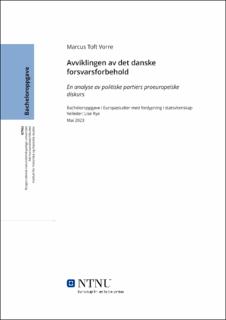Avviklingen av det danske forsvarsforbehold
Bachelor thesis
Permanent lenke
https://hdl.handle.net/11250/3075935Utgivelsesdato
2023Metadata
Vis full innførselSamlinger
Sammendrag
Oppgavens formål er å bidra med ny litteratur om den danske tilnærmingen til europeisk integrasjon og tar utgangspunkt i avviklingen av forsvarsforbeholdet. Konkret undersøkes det hvilke argumenter som utvalgte politiske partier har begrunnet sitt ønske om å avvikle forbeholdet med. Funnene som gjøres skal bidra til å besvare oppgavens problemstilling: “Var det danske ‘ja’ til å avvikle forsvarsforbeholdet et resultat av Russlands invasjon av Ukraina, eller et reelt ønske om dypere europeisk forsvarsintegrasjon?” For å besvare dette spørsmålet gjør oppgaven bruk av en diskursanalyse som metodisk tilnærming. Ja-argumentene som benyttes av de fire partiene Socialdemokratiet, Venstre, Liberal Alliance og Alternativet, analyseres og utgjør det empiriske grunnlaget. Konstruktivismen forklarer hvordan diskurser oppstår i samspill med hverandre og innehar konstituerende makt. Sådan forklarer teorien opp hvordan de utvalgte partiene evner å påvirke opinionens respons i folkeavstemningen. Med utgangspunkt i Schmidts teori, diskursiv institusjonalisme (DI), demonstrerer oppgaven hvordan partiene påvirket “ja”-diskursen med både kognitive og normative ideer. DIs skille mellom ideer fungerer som et analyseapparat som kategoriserer og oversetter kognitive og normative ideer til henholdsvis responsive og verdibaserte argumenter. Funnene som gjøres i empirien trekkes inn i diskusjonen i søket etter å besvare problemstillingen. Konklusjonen hevder at de to potensielle forklaringene, Ukraina-krigen og ønsket om europeisk forsvarsintegrasjon, begge har vesentlig forklaringskraft. Oppgavens hovedfunn er derfor at Danmark ønsket større innflytelse i EU, økt selvbestemmelse og utenrikspolitisk handlingsrom gjennom forsvarsintegrasjon, men at Ukraina-krigen tydeliggjorde behovet for å avvikle forsvarsforbeholdet. The purpose of this paper is to contribute new literature on the Danish approach to European integration, focusing on the abolition of the defence opt-out. Specifically, it examines the arguments that selected political parties have used to advocate their desire to abolish the defence opt-out. The findings will help to answer the research question: “Was Denmarks ‘yes’ to abolishing the defence opt-out a result of Russia’s invasion of Ukraine or a genuine desire for deeper European defence integration?” To answer this question, the paper uses a discourse analysis as a methodological approach. The “yes” arguments used by the four political parties - Socialdemokratiet, Venstre, Liberal Alliance and Alternativet - are analysed and form the empirical basis. Constructivism explains how discourses emerge in interaction with each other and have constitutive power. Thus, the theory explains how the selected parties are able to influence the public opinion in the referendum. Based on Schmidt’s theory of discursive institutionalism (DI), the paper demonstrates how parties influenced the “yes”-discourse with both cognitive and normative ideas. DI’s distinction between ideas is used as an analytical tool that categorises and translates cognitive and normative ideas into responsive and value-based arguments. The findings from the empirical basis are brought into the discussion in the search for an answer to the research question. The conclusion argues that both potential explanations, the Ukraine war and the desire for European defence integration, have significant explanatory power. The main finding of the paper is therefore that Denmark wanted greater influence in the EU, increased autonomy and flexibility in foreign policy through defence integration, but the Ukraine war elucidated the need for an abolition of the defence opt-out.
